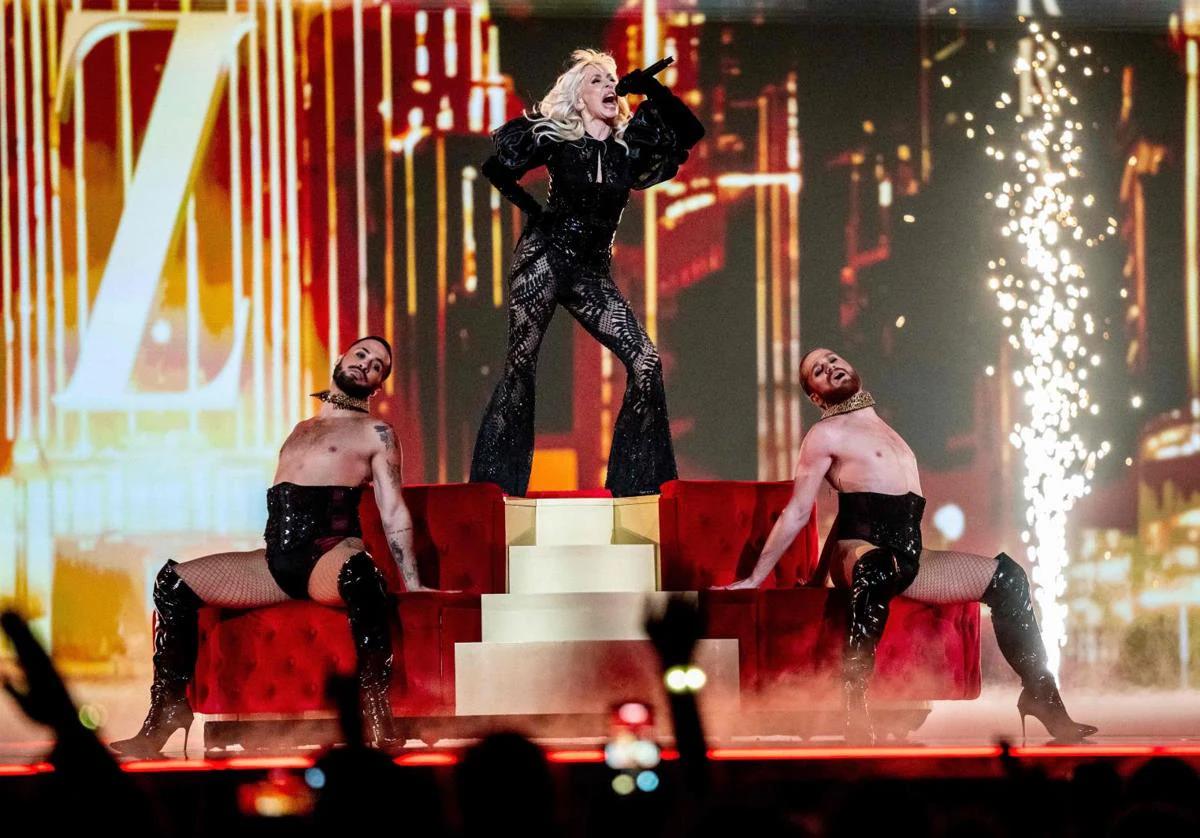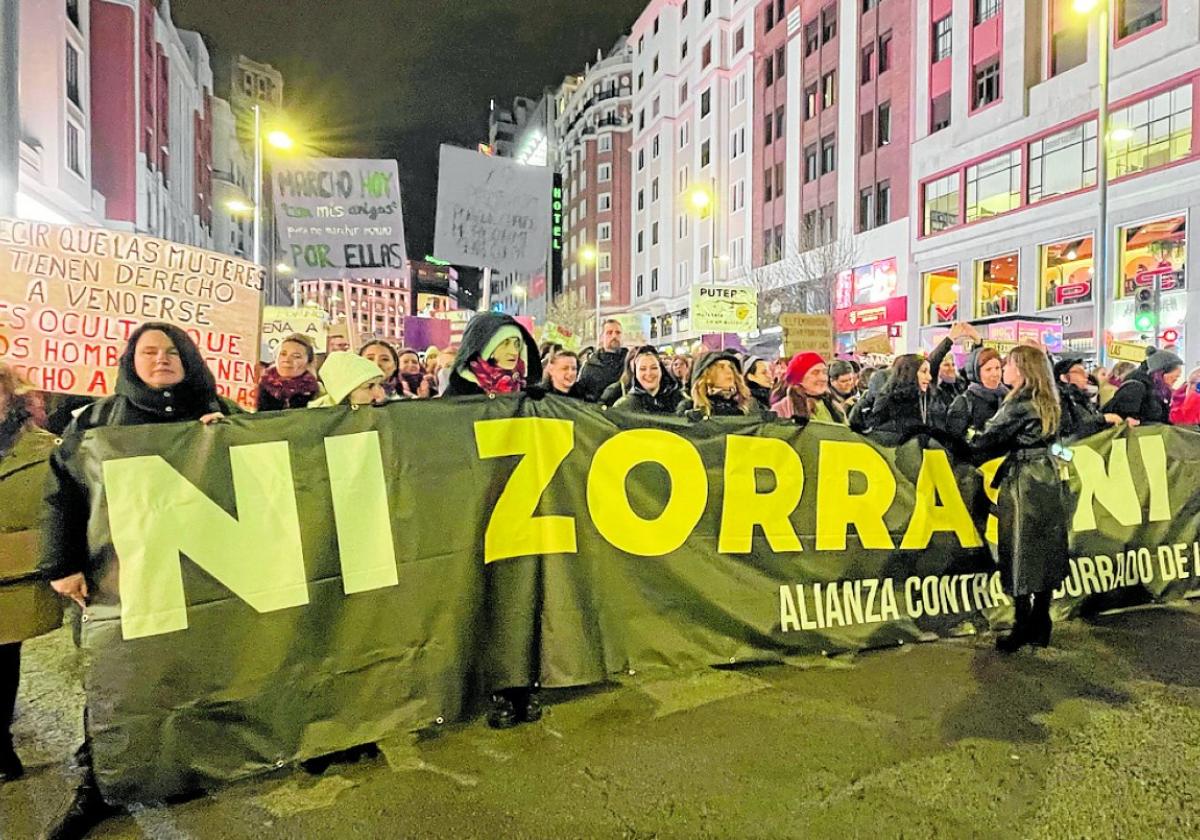

Sections
Highlight

Manuel Meyer
Madrid
Friday, 10 May 2024, 11:44
Every time María Bas and Mark Dasousa have taken to the stage in Spain recently, chants of "Zorra, Zorra" resound around the concert halls. The word "zorra" literally means "vixen" in Spanish, but is mainly used pejoratively for "slut" or "bitch".
The uninitiated might now think that singer María Bas is not particularly popular. But that's not the case. On the contrary. The fact is that Zorra is the title of the song with which Spanish artistic duo Nebulossa will represent Spain in the final of the Eurovision Song Contest in Malmö, Sweden, on Saturday.
María and Mark admit that they were surprised themselves when they received the most votes at the Benidorm festival organised by national broadcaster RTVE in February and thus became Spain's Eurovision representatives. After all, the two don't really fit in with the cool, youthful image of the contest.
María is 56 years old, Mark is 50, they have been married for 20 years and have two children. They run a hairdressing salon in Ondara, a quiet town inland from the Costa Blanca near Alicante. Mark is also a music producer and has a small recording studio in the town of 7,000 inhabitants.
From a musical point of view, the duo was previously virtually unknown in Spain. They have been performing together at local festivals since 2018. Nebulossa released their first single in 2020. A few more songs were added in 2023, but they only really attracted a little attention in the LGBT+ scene. And that was it.
Mark plays keyboards on stage and María, who likes to call herself Mery, sings - but not particularly well. Nor can it be said that she is incredibly talented as a dancer. So the choreographic focus of her stage show is probably deliberately on the two male dancers with full beards, who accompany María in overknee stiletto boots, lots of plush and latex corsets and tight glitter thongs.
But you also have to admit: her retro-pop song in an 80s electro style has a very catchy rhythm and simple, repetitive lyrics that are easy to sing along to. Above all, however, it has a very topical and socio-politically highly explosive message: the song is about feminist self-empowerment. It's about strong, emancipated and independent women who don't owe anyone an explanation, who do what they want. And if such women are labelled "sluts", then they should be proud of it. That's the message.
Zorra quickly became the new anthem of the LGBT+ scene in Spain and is currently being played up and down the country on all radio stations and in clubs.
"We seem to have managed to give the word Zorra a new meaning and now we want to take this message to Europe," singer María Bas has said in interviews.
Can Zorra really be used to celebrate a verbal feminist liberation? Spain's feminist movements don't think so. On International Women's Day on 8 March, there were many placards with slogans such as "Before he killed her, he called her 'zorra'," at large demonstrations in Madrid. Other banners clearly referenced the polarising Eurovision song and read "Neither slut nor submissive". In just a few days after Zorra was chosen to represent Spain at Eurovision, the Spanish institute for women received 491 calls of complaint.
The mere idea that thousands of young girls in Spain and Europe will be told at the Eurovision final that they should proudly call themselves "sluts" in order to neutralise the term as an insult angers Jana Bravo from the Madrid Federation for Women's Rights (MFM).
"The banalisation or appropriation of a macho insult cannot be the way to demand women's rights and self-realisation," said Bravo in an interview with this newspaper. For Bravo, categorising the song lyrics as feminist is almost "an insult to the mind".
Within a few hours, their women's rights organisation collected more than 1,500 protest signatures, which were submitted to the Spanish broadcaster RTVE with the request not to send the Zorra song to Malmö. Bravo's movement reminded Spanish television that offensive expressions and inappropriate language are not permitted in the lyrics and performances of Eurovision songs.
In 2021, Italian group Maneskin had to rewrite the lyrics "You better grab your balls" to "You better not make any more mistakes".
RTVE had the word "Zorra" translated as "vixen" for Eurovision instead of using the actual meaning "bitch" or "slut", and the text was waved through by the organisation.
As a result, Montserrat Boix resigned as gender equality officer at RTVE in protest and apologised to the victims of sexist violence for the choice of the song.
The text may no longer sound so bad in other languages, but the message still remains in Spanish. A message that is completely unacceptable, according to parliamentarians from various parties. Conservative opposition politicians see it as a disgrace. The right-wing populist Vox regional MP from Alicante, Gema Alemany, called the song an "insulting and humiliating attack on the dignity of women".
This was criticism that Spain's Socialist head of government Pedro Sánchez was only too happy to take up for a sweeping attack on the right. The song and its message are good, he said, and, above all, they show that feminism can also be entertaining. "The ultra-right and their supporters would probably have preferred Cara al Sol," he said in a radio interview, alluding to the party anthem of the fascist Falange during the Franco dictatorship. "I, on the other hand, prefer songs like Zorra, which ultimately speak of things that we all - men and women - share, namely equality," said the Spanish prime minister.
He was supported by his minister for Equality Policy, Ana Redondo, who assured him that Zorra was a good choice for the European music competition to present justified claims in a provocative, innovative and funny way.
However, not all Socialist party colleagues share the opinions of Sánchez and Redondo. Former PSOE MP Elena Valenciano wrote on Twitter: "I don't like being called a Zorra, nor do I like it when they call my daughter that. Not even in jest. We don't have to resort to verbal violence to demand our freedom."
Socialist Carmen Calvo, a previous deputy prime minister under Sánchez, recalled that "Zorra" was the last word that many women heard, before being beaten by their husbands, thrown down the stairs or even killed.

Hardly any other Eurovision Song Contest entry has caused as much debate and criticism in Spain in recent years as Zorra. Even the Catholic Church has had its say. Alicante's Bishop José Ignacio Munilla was convinced that it would upset many people with feminist sensibilities if the reaction to the humiliation of women was that women should accept this humiliation and be proud of it.
Whether Zorra is feminism or the exact opposite is a question that is currently dividing the whole of Spain. There is a lot of criticism. But a large part of the population is also enthusiastic about the song. The song has already been played 14.4 million times on the streaming service Spotify. A record even internationally. Only the Eurovision entries from Italy, the Netherlands and France have been played more often.
The fact is: María Bas will be in the Eurovision final in Malmö, Sweden, on 11 May. This is because the five biggest Eurovision contributors Germany, France, Great Britain, Spain and Italy are always automatically in the final, while the other 32 countries first had to qualify in the semi-finals earlier this week.
María, accompanied by Mark Dasousa and the dancers, will shout out the following lyrics in front of 150 million viewers at one of the world's biggest televised events. The official translation to English uses the word "vixen"; however to get the real sense of the original version, read "bitch" or "slut":
"I know that I'm just a vixen to you / My past is gobbling you up / I know I'm the black sheep / The misunderstood, the one made of stone."
"I know I'm not who you want me to be / I get it, it's driving you up the wall / But this is just my nature / Can't be bothered changing for you.
"I'm in a good place now / It was just a matter of time / I'm gonna hit the streets / And shout out what I feel from the rooftops.
"If I head out solo, I'm a bit of a vixen / If I'm having fun, I'm the biggest vixen / If I stretch the night till it's daylight / I'm an even bigger vixen.
"When I get what I want /It's never because I deserve it /And even though I'm taking on the world / No one appreciates it at all."
Everyone has to decide for themselves whether they interpret this text as a banalisation of macho language or as a feminist liberation anthem. Another thing is whether Nebulossa will be successful at Eurovision with their polarising "slut" song.
The Spanish Eurovision record over the past 20 years is not good. Spain usually ends up in the bottom places. And this time too, the Eurovision bookies are putting Spain in the bottom third.
The controversial feminism debate surrounding the song is unlikely to change much as the rest of Europe is unlikely to notice. This is because the focus of the international furore is primarily on Israel's participation in view of the Gaza war, which has led to many calls for a boycott.
Noticia Patrocinada
Publicidad
J. Gómez Peña y Gonzalo de las Heras (gráfico)
Encarni Hinojosa | Málaga, Encarni Hinojosa y Antonio M. Romero
Sara I. Belled y Jorge Marzo
Esta funcionalidad es exclusiva para registrados.
Reporta un error en esta noticia

Debido a un error no hemos podido dar de alta tu suscripción.
Por favor, ponte en contacto con Atención al Cliente.

¡Bienvenido a SURINENGLISH!

Tu suscripción con Google se ha realizado correctamente, pero ya tenías otra suscripción activa en SURINENGLISH.
Déjanos tus datos y nos pondremos en contacto contigo para analizar tu caso

¡Tu suscripción con Google se ha realizado correctamente!
La compra se ha asociado al siguiente email
Comentar es una ventaja exclusiva para registrados
¿Ya eres registrado?
Inicia sesiónNecesitas ser suscriptor para poder votar.